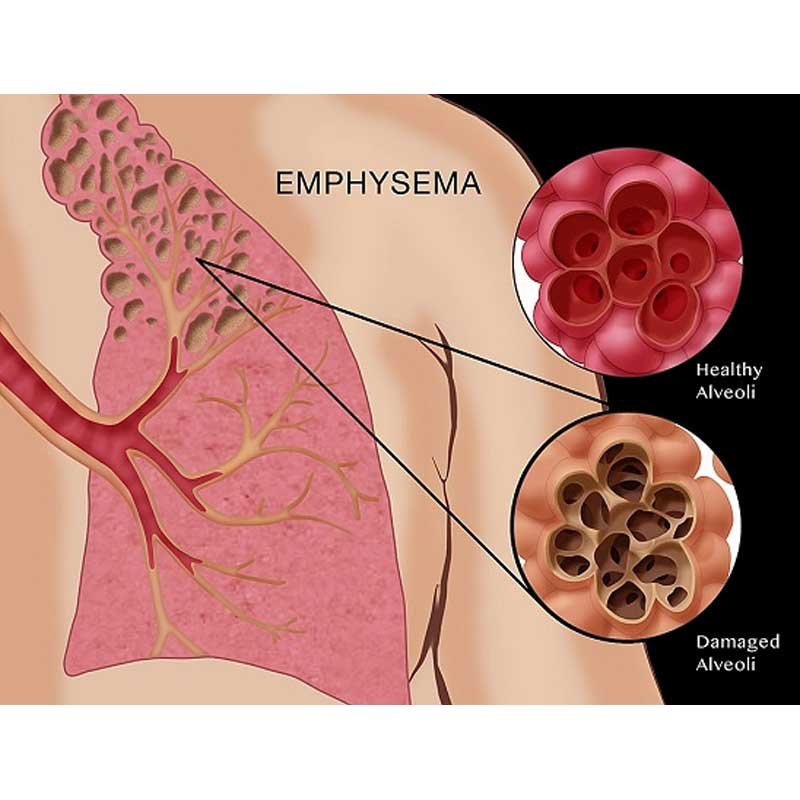What Are the Best Treatments for Emphysema?

Emphysema, a chronic lung condition, significantly impacts individuals worldwide, particularly in regions with high smoking rates. This disease, a form of chronic obstructive pulmonary disease (COPD), damages lung air sacs, leading to breathing difficulties.
As per the World Health Organization (WHO), COPD, including emphysema, ranks as the third most common cause of death globally. However, although emphysema has no cure, various treatments can effectively manage symptoms, enhance life quality, and decelerate disease progression.
This blog delves into the top emphysema treatments, including medications, pulmonary rehabilitation, and surgical remedies.
How is Emphysema Treated?
Dr Dinesh Mittal notes, “Emphysema typically worsens over time. Treatment strategies focus on slowing its progression and maximizing the function of the remaining healthy lung tissue. The choice of treatment depends on the severity of the individual’s emphysema.”
Treatment options may include:
- Bronchodilators: These medications help relax the muscles around the airways, making breathing easier. They are often used as a first-line treatment for emphysema and COPD.
- Inhaled Corticosteroids: Inhaled steroids can help reduce inflammation in the airways, which is common in emphysema and COPD. They are often used in combination with bronchodilators.
- Antibiotics: In some cases, antibiotics may be prescribed to treat bacterial infections that can worsen symptoms of emphysema.
Oxygen Therapy: Supplemental oxygen therapy may be necessary for people with severe emphysema to ensure they get enough oxygen. - Bronchoscopic lung volume reduction: Bronchoscopic lung volume reduction entails placing a one-way valve into the airways to allow air to exit but not enter specific lung sections. This reduces trapped air, easing breathing. However, not all emphysema patients qualify for this intervention.
- Lung Volume Reduction Surgery (LVRS): In this procedure, damaged lung tissue is removed to allow the healthier parts of the lung to function more effectively. LVRS can improve lung function and quality of life in some people with emphysema.
- Lung Transplant: In severe cases of emphysema where other treatments have not been effective, a lung transplant may be considered. However, lung transplants are major surgeries with significant risks and complications.
What Lifestyle Changes Can Help Manage Emphysema?
Managing emphysema can be aided by implementing the following lifestyle changes:
- Smoking Cessation: The most crucial step in managing emphysema is to quit smoking. Smoking cessation can help slow the progression of the disease and improve lung function.
- Healthy Diet: Eating a balanced diet rich in fruits, vegetables, whole grains, and lean proteins can help support overall health and lung function.
- Regular Exercise: Staying active can help improve lung function, strengthen muscles, and reduce breathlessness. It is working with a healthcare provider to develop a safe and effective exercise plan.
A happy patient of Dr Mittal shared, “I have been living with emphysema for several years, and it has been challenging. However, with the help of Dr. Mittal and his team, I have learned how to manage my condition effectively. I am grateful for their support and guidance.”
“Emphysema was a daunting diagnosis for me, but Dr Mittal’s expertise and care have made a significant difference in my life. With the right treatment and lifestyle changes, I feel more in control of my health,” said another patient.
What is the Cost of Treating Emphysema in India?
The cost of treating emphysema in India can vary depending on several factors, including the severity of the condition, the type of treatment required, and the hospital or healthcare facility chosen. However, here is a general estimate of the cost range for various treatments:
- Medications: The cost of medications for emphysema can range from INR 500 to 2000 (USD 7 to 28) per month.
- Pulmonary Rehabilitation: The cost of pulmonary rehabilitation programs can vary but generally range from INR 10,000 to 50,000 (USD 140 to 700) for a complete program.
- Oxygen Therapy: The cost of oxygen therapy can vary depending on the equipment type and the use duration but may range from INR 5000 to 10,000 (USD 70 to 140) per month.
- Lung Volume Reduction Surgery (LVRS): The cost of LVRS can range from INR 1,00,000 to 3,00,000 (USD 1400 to 4200).
- Lung Transplant: The cost of a lung transplant can vary but may range from INR 10,00,000 to 20,00,000 (USD 14,000 to 28,000) or more.
Note: These are rough estimates; actual costs may vary based on individual circumstances and the specific healthcare provider.
Conclusion
While emphysema is a chronic and progressive disease, several treatments are available that can help manage symptoms and improve quality of life. By working closely with healthcare providers and making lifestyle changes, people with emphysema can take control of their health and maintain an active lifestyle.
Remember, early diagnosis and treatment are vital to managing emphysema effectively. If you or a loved one is experiencing symptoms of emphysema, such as shortness of breath or chronic cough, consult a healthcare professional for an accurate diagnosis and personalized treatment plan.
FAQs
1. Can emphysema be cured?
No, emphysema cannot be cured, but treatment can help manage symptoms and slow its progression.
2. Is emphysema the same as chronic bronchitis?
No, emphysema and chronic bronchitis are both forms of COPD, but they affect the lungs differently. Emphysema damages the air sacs in the lungs, while chronic bronchitis causes inflammation and narrowing of the airways.
3. Can emphysema be prevented?
Emphysema is often caused by smoking, so quitting smoking is the best way to prevent it. Avoiding exposure to air pollution, occupational dust, and chemicals can also help reduce the risk.
4. Can emphysema lead to other health problems?
Emphysema can lead to other health problems, including respiratory infections, heart problems, and weight loss.
5. Can emphysema be managed without medication?
While medication is often necessary to manage emphysema, lifestyle changes such as quitting smoking, eating a healthy diet, and exercising regularly can also help improve symptoms and quality of life.
Explore more blogs: ECMO: last resort for many heart and lung situations
